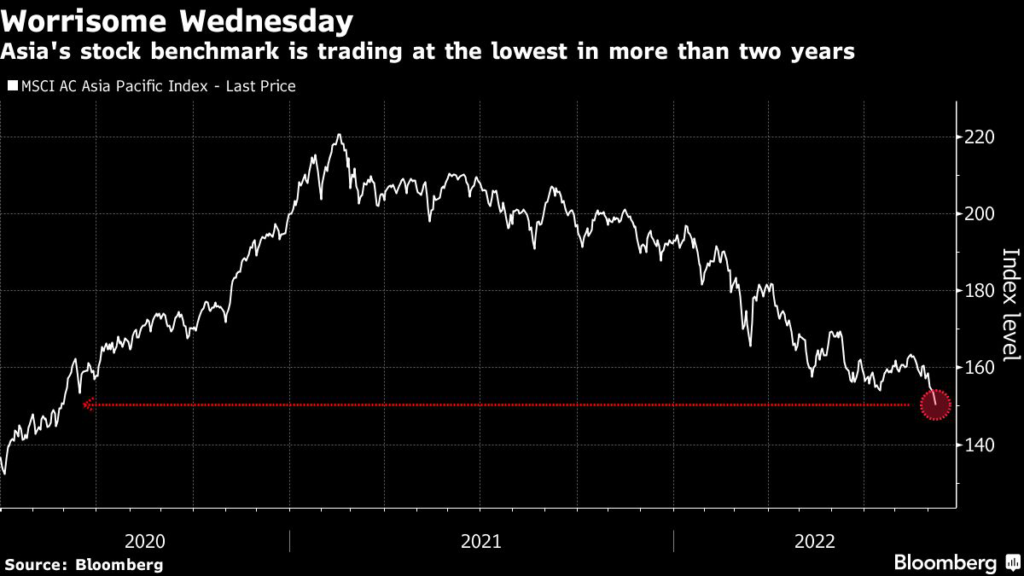A fresh sell-off hit Asian equities on Wednesday as concerns over a stronger dollar and rising global interest rates added to pressure on capital flows.
(Bloomberg) — A fresh sell-off hit Asian equities on Wednesday as concerns over a stronger dollar and rising global interest rates added to pressure on capital flows.
The MSCI Asia Pacific Index dropped as much as 1.8% to its lowest since May 2020 as most sectors were in the red. Tech shares led declines, given the sector’s sensitivity to higher borrowing costs and the global economy. Benchmarks in Taiwan, the Philippines, and Vietnam fell the most, with the latter two sliding more than 2% each.
The “strong dollar is never good news for Asian markets,” Sanford C. Bernstein strategists including Rupal Agarwal wrote in a note late Tuesday. “It tends to increase the cost of foreign debt, results in higher capital outflows and puts pressure on central banks to maintain the attractiveness of their exports and the yield spreads.”
Regional currencies were under pressure, with the Korean won at its lowest in more than 13 years, the Philippine peso dropping past 57 per dollar for the first time and the Malaysian ringgit falling to a 24-year low. Such rapid depreciation can further damp appetite for Asian assets.
By contrast, Chinese equities held up relatively well. The CSI 300 Index was little changed as chipmakers advanced after President Xi Jinping called for a stronger effort to advance key technologies. Still, the nation’s Covid-19 lockdowns continue to expand, keeping a cap on equity gains.
A risk-off mood is taking hold ahead of Federal Reserve Chairman Jerome Powell’s speech on Thursday, as well as a line-up of other Fed speakers at various events this week. Investors expect Powell to signal a continued aggressive tightening cycle after the August ISM services index unexpectedly rose to a four-month high. Bond yields soared across tenors and a dollar gauge climbed for a third session to a fresh high.
Global funds have net sold about $1.1 billion worth of emerging Asia excluding China shares this week, adding to the $2.4 billion in outflows seen last week, according to latest data compiled by Bloomberg. Taiwan has accounted for a majority of the outflows, with geopolitical tensions and worries about the semiconductor cycle causing net redemptions of $41 billion in 2022.
Valuations for MSCI’s Asia gauge continue to crawl toward a pandemic low. The measure is trading at about 12 times forward earnings — inching closer to the 10.6 multiple seen in March 2020.
Asia “is a difficult story” right now, said Steen Jakobsen, chief investment officer at Saxo Bank. “We see relatively weak growth on the consumer side in China, and relatively weak stories across” the region except for certain sectors such as energy, commodities and defense, he added.
SECTORS TO WATCH
- Chip stocks are in focus after a senior executive at Samsung Electronics warned that the semiconductor industry could be in for a rocky close to 2022
- Shares of China aluminum producers including Shandong Nanshan rallied after a report that President Xi Jinping has vowed to strengthen key technologies. Producers of the metal elsewhere in Asia fell as stockpiles jumped
- Asia’s energy-related shares including Santos slid after oil retreated on concern a global slowdown will cut demand in Europe and the US just as China’s Covid Zero strategy hurts consumption
- PLDT led declines among Philippine telecommunication stocks as Maybank Securities downgraded the sector to neutral, citing rising competition and slower growth expectation in broadband fiber
- Nippon Yusen and other Japanese shipping stocks fell after a key official flagged concerns over an economic downturn
- Shree Cement led a rally in Indian makers of the key construction material as analysts expect the companies to hike prices as demand improves, while a recent decline in some commodity prices benefits the sector
MARKETS AT A GLANCE
- MSCI Asia Pacific Index down 1.3%
- Japan’s Topix index down 0.6%; Nikkei 225 down 0.7%
- Hong Kong’s Hang Seng Index down 0.8%; Hang Seng China Enterprises down 0.6%; Shanghai Composite up 0.1%; CSI 300 up 0.1%
- Taiwan’s Taiex index down 1.8%
- South Korea’s Kospi index down 1.4%; Kospi 200 down 1.5%
- Australia’s S&P/ASX 200 down 1.4%; New Zealand’s S&P/NZX 50 down 0.4%
- India’s S&P BSE Sensex Index down 0.2%; NSE Nifty 50 down 0.1%
- Singapore’s Straits Times Index down 0.4%; Malaysia’s KLCI up 0.2%; Philippine Stock Exchange Index down 2.3%; Jakarta Composite Index down 0.6%; Thailand’s SET Index up 0.4%; Vietnam’s VN Index down 2.7%
ADVANCERS
- Soho China jumped 11% in Hong Kong, the biggest gain since August 2021, after the property company said its Chairman Pan Shiyi has resigned to focus on supporting the arts and philanthropic pursuits
- Shidax rose 5.6% after Colowide said it made a proposal for its food service business
DECLINERS
- PHC Holdings fell 9.9% after it was cut to neutral from outperform at SMBC Nikko
- Posco declined 2.6% after the steelmaker said its entire production is down at Pohang steel mill with a typhoon flooding South Korea’s largest steel plant
Are you bullish on energy-related stocks and bonds? This week’s MLIV Pulse survey focuses on energy and commodities. Please click here to participate anonymously.
More stories like this are available on bloomberg.com
©2022 Bloomberg L.P.











